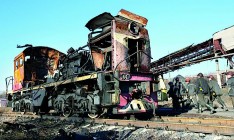Politics
State-owned assetsOver the past year, the losses of state-owned companies increased by a third to UAH 18 bn

Last year enterprises managed by public authorities have accrued a gross loss of UAH 17.8 bn. UAH 16.7 bn of this amount is the merit of state-owned companies, which are directly subordinated to ministries. This follows from the annual report on monitoring of the efficiency of state property drafted by the Ministry of Economic Development and Trade. By the end of 2012, the losses from the management of state assets amounted to UAH 11.8 bn, according to the data of the ministry.
The distinguished ones
The financial performance of the public sector is mainly dependent on the state of affairs in enterprises subordinated to the Ministry of Agrarian Policy, the Ministry of Infrastructure, the Ministry of Defense, the State Property Fund and the Ukroboronprom State Concern. From this list only the Ministry of Infrastructure and Ukroboronprom finished last year with profits of UAH 2.2 bn and UAH 490 mn, respectively, while the others incurred losses. The ministries say the main reasons for the unprofitability of state enterprises are the technical and moral depreciation of fixed assets, as well as rising prices of raw materials and energy, the cost of freight transportation and the increasing tax burden. Losses also generated due to the lack of state orders and an effective mechanism for the attraction of investments.
The greatest losses were registered by enterprises reporting to the Ministry of Energy and Coal. In total, these losses amount to UAH 18.5 bn, according to the data of monitoring of the Ministry of Economic Development and Trade. At the same time, only 10% of companies of the Ministry of Energy and Coal Industry are profitable – 44 of 442. The state-owned coal mines have shown the worst financial results. Over the past year their losses increased by 27% to UAH 15.128 bn.
First Deputy Director of the National Institute for Strategic Studies (NISS) Yaroslav Zhalilo says the losses of mines are due to production costs, the deep location of coal and depleted layers and the pricing policy. “When coal delivered to private corporations is sold at discount rates, the mines take the loss. This is done for the sake of social impact, for example, to reduce the cost of electricity,” says the expert.
He adds that it will be virtually impossible to overcome unprofitability by efficient management. Alternatively, preserving the mines until there is a chance to use technologies enabling production of coal in a more cost-effective way is possible. On the other hand, conservation of mines may cost more than maintaining them in working order. “Today, given the situation in the eastern part of the country and the EU’s willingness to help Ukraine, we can try to use a part of the European money for restructuring the domestic coal industry,” believes Zhalilo. At the same time, in his opinion, the effectiveness of the mines can also be improved through their privatization, but the share of such facilities in the total number will be minor.
Another black hole in the public sector is Naftogaz of Ukraine. Last year, the company increased its net loss by 14.2% compared to 2012 – up to UAH 12.521 bn. However, given the management structure of the company, it was not a subject for monitoring of the Ministry of Economic Development and Trade. This means that taking Naftogaz into account the public sector would show a loss of nearly UAH 30 bn.
What goes around comes around
It is difficult to say whether the Cabinet of Ministers will take into account the report of the Ministry of Economic Development and Trade and what it will do with the figures. For example, last year the ministry recommended the government to analyze the activities of enterprises, whose managers were rated as inefficient and, if necessary, consider the liquidation or privatization of such assets. It was also recommended to terminate contracts with those directors that were responsible for wage arrears.
But now the criteria for personnel decisions regarding the state’s top managers have changed. The most notable dismissals were effectuated in 2014 after the change of government. In particular, CEO of the Antonov company Dmytro Kiva and the head of the Ukroboronprom State Concern Serhiy Hromov were fired, despite that fact that Ukroboronprom was one of the most efficient holding companies based on the results of 2013, having increased net profits of its enterprises for the second consecutive year and paid off its wage arrears to its employees. Antonov finished the year with net profits of more than UAH 39 mn.






 of the agreement of syndication with Financial Times Limited are strictly prohibited. Use of materials which refers to France-Presse, Reuters, Interfax-Ukraine, Ukrainian News, UNIAN agencies is strictly prohibited. Materials marked
of the agreement of syndication with Financial Times Limited are strictly prohibited. Use of materials which refers to France-Presse, Reuters, Interfax-Ukraine, Ukrainian News, UNIAN agencies is strictly prohibited. Materials marked  are published as advertisements.
are published as advertisements.